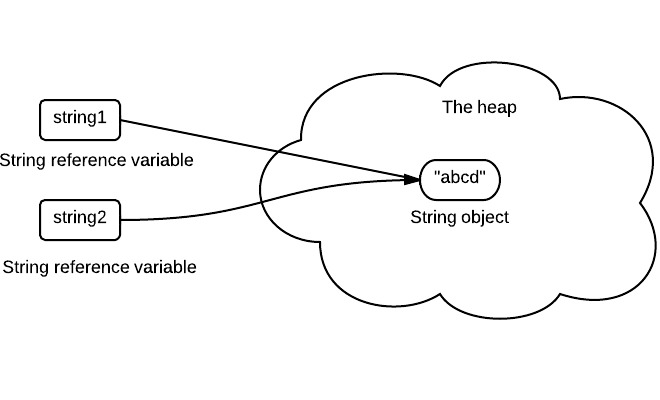Why Are Strings Immutable in Java? Trick Reasons and Benefits Described
Why Are Strings Immutable in Java? Trick Reasons and Benefits Described
Blog Article
What Is Unalterable Strings and Exactly How It Functions
In the world of shows, understanding the principle of immutable strings is vital for producing robust and safe and secure applications. Immutable strings refer to strings that can not be altered after they are created, guaranteeing data honesty and predictability within the code.
The Fundamentals of Unalterable Strings
Unalterable strings, as a basic concept in programs, are personality series that can not be transformed once they are created. This indicates that as soon as a string is designated a worth, that worth can not be modified. In languages like Python and Java, strings are immutable things, causing various ramifications in terms of memory administration and data stability.
Among the key benefits of unalterable strings is that they supply a sense of safety and security in data control. Given that the material of an immutable string can not be customized, it ensures that the initial data continues to be intact, lowering the risk of unplanned modifications throughout program execution (Why are strings immutable in Java?). This property also streamlines debugging procedures, as designers can rely on that as soon as a string is specified, its worth will not be inadvertently changed
Furthermore, immutable strings help with efficient memory usage. When a brand-new string is created based upon an existing one, as opposed to modifying the initial string, the brand-new worth is saved individually. This strategy boosts performance by reducing memory fragmentation and simplifying memory allocation processes. In general, comprehending the basics of unalterable strings is vital for grasping programming ideas and optimizing code efficiency.
Advantages of Immutable Strings
Structure upon the safety and efficiency advantages of immutable strings, their benefits include enhancing code integrity and streamlining simultaneous programs tasks. By being unalterable, strings can not be modified after creation, which gets rid of the danger of unintentional adjustments in the information they store. This fundamental immutability makes sure that once a string is developed, its value stays consistent throughout the program's execution, decreasing the opportunities of bugs triggered by unanticipated alterations.
Furthermore, unalterable strings add to code integrity by making it less complicated to reason about the state of a program. Since strings can not be changed, programmers can rely on that a string will certainly always hold the exact same value, simplifying debugging and upkeep initiatives. This predictability leads to much more secure and reputable codebases.

Implementation in Programming Languages
Within numerous programming languages, the unification of unalterable strings is a basic aspect that influences just how data is taken care of and manipulated within code frameworks. The implementation of unalterable strings differs throughout different programs languages, with each language providing its own systems to support this idea.

In contrast, languages like C and C++ do not have integrated support for immutable strings. Developers in these languages should manually apply immutability by enforcing guidelines within their code to avoid straight alterations to string objects.
Ideal Practices for Collaborating With Immutable Strings
When handling unalterable strings in programs languages like Java and Python, adhering to ideal methods ensures reliable and secure data control. Among the essential ideal techniques is to utilize StringBuilder or StringBuffer rather than straight controling strings, specifically when taking care of comprehensive concatenation procedures. These courses provide mutable options for string control, aiding to stay clear of unnecessary memory allocations and improving efficiency.
In addition, when functioning with sensitive data such as passwords or API secrets, it is important to avoid keeping them as plain message in immutable strings. Using protected storage systems like char selections or specialized libraries for managing sensitive details this page aids mitigate security risks linked with immutable strings.
Real-world Applications and Examples
Checking out useful executions of unalterable strings in different industries reveals their significant impact on information integrity and system reliability. In the health care industry, immutable strings play a critical function in making sure the safety and confidentiality of client data. By stopping unauthorized modifications to delicate information such as clinical records and prescriptions, unalterable strings assist maintain conformity with stringent privacy guidelines like HIPAA.
Financial establishments also gain from the unalterable nature of strings to improve the safety of client information and transaction documents. Unalterable strings aid stop fraudulence and unapproved modifications to financial details, offering a durable defense against cyber threats and ensuring the count on and self-confidence of customers.

Conclusion
Best techniques for functioning with immutable strings consist of staying clear of direct adjustments and utilizing techniques that return new string things. Real-world applications of immutable strings include data file encryption, caching, and string control jobs.
Unalterable strings refer to strings that can not be modified after Why are strings immutable in Java? they are created, making sure information stability and predictability within the code. When a new string is produced based on an existing one, instead than changing the initial string, the brand-new value is saved independently.In languages like Java and Python, strings are unalterable by default, suggesting that when a string things is created, its value can not be changed - Why are strings immutable in Java?. Finest practices for working with immutable strings consist of preventing direct modifications and using methods that return new string things. Real-world applications of unalterable strings include information file encryption, caching, and string control tasks
Report this page